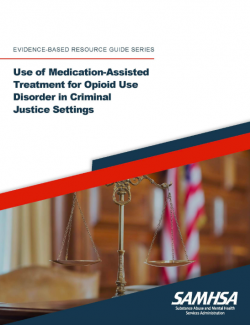Use of Medication-Assisted Treatment for Opioid Use Disorder in Criminal Justice Settings

The success of treatment and recovery of individuals with opioid use disorder (OUD) can vary. Most often, a combination of factors adds complexities to evaluating the effectiveness of services and interventions.
Worldwide, overdose is the leading cause of avoidable death among people who inject drugs. An important area of concern for the Substance Abuse and Mental Health Services Administration (SAMHSA) is promoting policies and practices to lower the risk of overdose for persons with opioid use disorder who are, or have been, in contact with criminal justice systems.
Following incarceration, individuals with opioid use potentially enter back into the environment where their substance use originated. Unfortunately, this puts the individual at high risk for relapse. Further, their tolerance for opioids is reduced while incarcerated putting them at high risk for overdose.
This guide focuses on using medication-assisted treatment for opioid use disorder in jails and prisons and during the reentry process when justice-involved persons return to the community. It provides an overview of policies and evidence-based practices that reduce the risk of overdose and relapse.
The guide includes:
- An overview of the current situation and the challenges to implementing medication-assisted treatment.
- Current evidence on effectiveness of programmes and practices to address the use of mediation- assisted treatment in a criminal justice system.
- Description of programmes
- Practical information to consider when selecting and implementing programmes
- Guidance and further resources